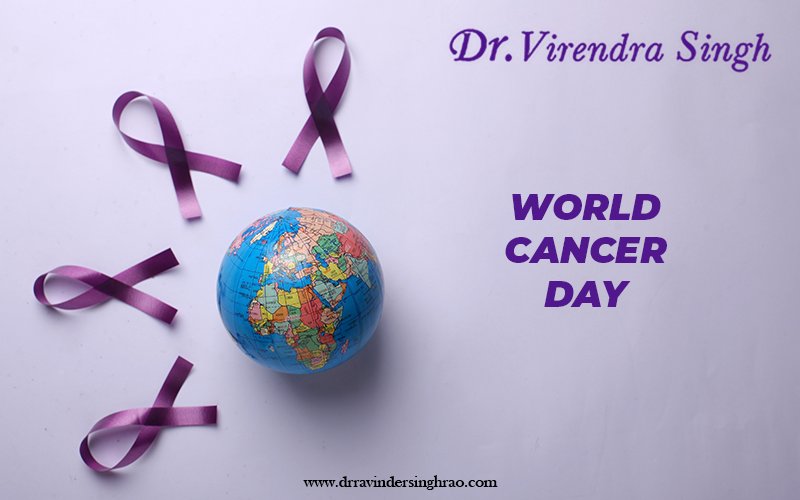
World Cancer Day, observed annually on February 4th, inspires the whole community to increase awareness, enhance education, and spark individual, group, and governmental action in the battle against cancer. The Union for International Cancer Control (UICC) organizes World Cancer Day, a worldwide celebration that emphasizes the pressing need to eradicate avoidable disparities in cancer treatment. It is a day to raise awareness worldwide and serves as a powerful unifying force against a disease that transcends country boundaries and social divides. Cancer is the second leading cause of death worldwide, with millions of new cases and deaths each year. It has an impact on families, communities, and entire countries in addition to the people who are diagnosed.
The goal of the day is very clear: to save lives by educating the public, busting myths and misconceptions, and pressing people and governments everywhere to combat this fatal illness. On World Cancer Day 2025, Dr. Virendra Singh, a renowned pulmonologist, emphasizes the critical importance of early detection and prevention in the battle against cancer. He promotes a comprehensive approach to cancer awareness, especially with regard to lung cancer, which continues to be one of the main causes of cancer-related deaths globally, and has years of experience in respiratory health.
As these actions can greatly lower the risk of cancer, he exhorts people to prioritize routine checkups, lead healthy lives, and abstain from smoking. Dr. Virendra Singh also encourages open discussions about cancer, aiming to dispel myths and create a supportive environment for those affected.
COPD Specialist, Asthma Specialist, ILD Lung Specialist, Sleep Apnea Specialist
The Theme for World Cancer Day 2025
The theme for World Cancer Day 2025 is “United by Unique”. The theme highlights the importance of personalized care that takes into account the unique needs and experiences of each person.
What are the Risk Factors for Cancer?
Knowing the cancer risk factors is essential for early identification and preventative initiatives. Numerous risk factors are controllable through lifestyle modifications, however, some, like age or heredity, cannot be avoided. By recognizing these risk factors, people can take preventative actions that can greatly lower their chance of getting cancer and make well-informed decisions about their health. Here are some of the common risk factors for cancer:
1. Age and Gender
Age is one of the most significant risk factors for cancer. The accumulation of environmental exposures and genetic alterations over time raises a person’s risk of acquiring cancer. Additionally, some malignancies are more prevalent in particular genders. For instance, women are more likely to develop breast cancer than men are to develop prostate cancer.
2. Family History and Genetics
Certain malignancies are far more likely to occur in those who inherit gene mutations. Cancer risk is significantly influenced by family history, particularly for malignancies like breast, ovarian, and colon cancer. Mutations in genes such as BRCA1 and BRCA2 are well-known for increasing the risk of breast and ovarian cancers.
3. Tobacco Use
The primary cause of cancer globally, smoking is associated with a number of cancers, such as cancers of the throat, bladder, mouth, and lungs. The chance of getting cancer is increased even by secondhand smoking exposure. A significant amount of cancer fatalities worldwide are caused by tobacco-related cancers.
4. Poor Diet and Physical Inactivity
Diet and lifestyle play a major role in cancer prevention. The chance of developing malignancies like stomach, pancreatic, and colon cancer can be raised by consuming a diet heavy in processed foods, red meat, and unhealthy fats. Obesity and inactivity significantly increase the risk of developing breast and endometrial cancer, among other cancers.
5. Exposure to Environmental Carcinogens
Radiation and hazardous chemical exposures in the environment can raise the risk of cancer. Cancers including mesothelioma, lung cancer, and leukemia have been related to exposure to toxins like asbestos, pesticides, and industrial chemicals. Air pollution is also a growing environmental concern that contributes to cancer risk.
6. Infections
The chance of getting cancer can be raised by certain bacterial and viral illnesses. For instance, Hepatitis B and C are linked to liver cancer, but HPV (Human Papillomavirus) is a major cause of cervical cancer. Gastric cancer risk can also be raised by persistent bacterial infections, including Helicobacter pylori.
7. Hormonal Factors
Hormones play a key role in the development of some cancers, particularly those that are hormone-sensitive, such as ovarian, breast, and endometrial cancer. Through hormone replacement therapy (HRT), prolonged exposure to hormones like estrogen can raise the risk of developing cancer.
8. Alcohol Consumption
A number of malignancies, including those of the liver, breast, mouth, and esophagus, are associated with excessive alcohol consumption. Over time, the risk rises as the amount of alcohol drank does.
What are the Preventive Measures Against Cancer?
One of the most effective strategies in the worldwide battle against cancer is preventing the disease before it starts. Getting vaccinated against viruses that cause cancer and adopting healthier lifestyle choices are just two examples of prevention. People can reduce their risk of cancer and enhance their general health by implementing specific preventive measures. Here are some of the key preventive measures against cancer:
- Healthy Diet and Nutrition
Maintaining a nutritious diet is crucial for cancer prevention. Essential vitamins and antioxidants that promote the body’s natural defenses against cancer are found in a balanced diet full of fruits, vegetables, whole grains, and lean meats. In contrast, the chance of developing cancers including colorectal and breast cancer can be raised by eating a diet heavy in processed foods, red meat, and unhealthy fats.
- Regular Physical Activity
Regular exercise is crucial for lowering the risk of several malignancies in addition to helping one maintain a healthy weight. Exercise lowers inflammation, boosts the immune system, and supports hormonal balance. At least 150 minutes a week of moderate-intensity exercise, such as jogging, cycling, or brisk walking, is recommended to lower the risk of cancer. Strength training activities should also be included twice a week to increase metabolism and muscle tone.
- Avoid Tobacco Use
Globally, tobacco use is the primary cause of avoidable cancer, especially lung cancer, which is among the worst forms of the disease. Smoking and chewing tobacco increase the risk of various cancers, including cancer of the lungs, throat, mouth, and bladder. Avoid secondhand smoke exposure, which also raises the risk of lung cancer, and stop smoking or never start.
- Vaccination against Cancer-Causing Viruses
Infections like Hepatitis B and the HPV virus can cause some types of cancer, including liver and cervical cancer. There are vaccines that can help prevent associated tumors and provide protection against certain viruses. To lower your risk of developing cancer, be vaccinated against HPV to prevent cervical and other cancers, and make sure you get vaccinated against Hepatitis B, especially if you’re at risk for liver cancer.
FAQs
What is World Cancer Day?
Every year on February 4th, the world observes World Cancer Day to increase awareness of the disease, encourage prevention, and emphasize the value of early identification and treatment.
What is the Theme of World Cancer Day 2025?
The theme for World Cancer Day 2025 is “United by Unique”.
Why is World Cancer Day important?
It offers a chance to bring people together globally in the battle against cancer by disseminating information, dispelling myths, and promoting action for improved cancer treatment and research.
How can I participate in World Cancer Day 2025?
Participation options include promoting routine health checks, giving to cancer research organizations, going to local events, and raising awareness on social media.
What are some common cancer prevention tips?
One of the most important ways to prevent cancer is to maintain a balanced diet, exercise frequently, abstain from tobacco, limit alcohol use, and get regular checkups.
Can cancer be cured?
Early detection can help treat and even cure many cancers. The individual’s overall health, stage, and kind all affect the prognosis.
